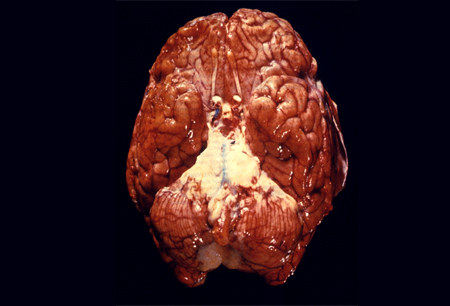Resumo
Определение
Анамнез и осмотр
Ключевые диагностические факторы
- headache
- neck stiffness
- fever
- altered mental status
- confusion
- photophobia
- vomiting
- seizures
- hypothermia (infants)
- irritability (infants)
- lethargy (infants)
- poor feeding (infants)
- apnea (infants)
- focal neurologic deficit
- abnormal eye movement
- facial palsy
- balance problems/hearing impairment
- bulging fontanel in infants
Другие диагностические факторы
- high-pitched cry (infants)
- rash
- papilledema
- Kernig sign
- Brudzinski sign
Факторы риска
- age ≤5 or ≥65 years
- crowding
- exposure to pathogens
- nonimmunized infants
- immunodeficiency
- cancer
- asplenia/hyposplenic state
- cranial anatomic defects
- cochlear implants
- contiguous infection
- smoking
Диагностические исследования
Исследования, которые показаны в первую очередь
- cerebrospinal fluid (CSF) cell count and differential
- cerebrospinal fluid (CSF) protein
- cerebrospinal fluid (CSF) glucose
- cerebrospinal fluid (CSF) Gram stain
- cerebrospinal fluid (CSF) culture
- antigen detection in cerebrospinal fluid (CSF)
- blood culture
- CBC and differential
- CRP
- electrolytes, calcium (Ca), magnesium (Mg), glucose
- coagulation profile (prothrombin time, INR, activated PTT, fibrinogen, fibrin degradation products)
- CT head
- polymerase chain reaction (PCR)
Исследования, проведение которых нужно рассмотреть
- MRI head
- transcranial Doppler
- serum procalcitonin
Неотложные исследования
- heparin-binding protein (HBP)
- rapid antigen cerebrospinal fluid (CSF) tests
- metagenomic next-generation sequencing (mNGS)
Алгоритм лечения
Составители
Эксперты-консультанты
Rodrigo Hasbun, MD, MPH
Professor of Medicine
UT Health Mc Govern Medical School
Houston
TX
Declarações
RH has received research support and personal fees from Biomeriaux. RH is an author of references cited in this topic.
Omaima El Tahir, MD
PhD Candidate
Department of Pediatric infectious Diseases and Immunology, AI&II
Amsterdam UMC, Vrije Universiteit Amsterdam
Amsterdam
The Netherlands
Declarações
OET declares that she has no competing interests.
Agradecimentos
Dr Rodrigo Hasbun and Omaima El Tahir would like to gratefully acknowledge Dr Marceline Tutu van Furth, previous contributor to this topic.
Declarações
AMTvF declares that she has no competing interests.
Revisores
Catherine Derber, MD
Professor
Department of Medicine
Eastern Virginia Medical School
Norfolk
VA
Declarações
CD declares that she has no competing interests.
Guy Thwaites, MA, MBBS, PhD, MRCP, FRCPath
Wellcome Trust Clinical Research Fellow
Centre for Molecular Microbiology and Infection
Imperial College London
London
UK
Disclosures
GT declares that he has no competing interests.
Peer reviewer acknowledgements
BMJ Best Practice topics are updated on a rolling basis in line with developments in evidence and guidance. The peer reviewers listed here have reviewed the content at least once during the history of the topic.
Disclosures
Peer reviewer affiliations and disclosures pertain to the time of the review.
References
Key articles
Hasbun R. Progress and challenges in bacterial meningitis: a review. JAMA. 2022 Dec 6;328(21):2147-54. Abstract
van de Beek D, Cabellos C, Dzupova O, et al. ESCMID guideline: diagnosis and treatment of acute bacterial meningitis. Clin Microbiol Infect. 2016 May;22(suppl 3):S37-62.Full text Abstract
Brouwer MC, McIntyre P, Prasad K, et al. Corticosteroids for acute bacterial meningitis. Cochrane Database Syst Rev. 2015 Sep 12;(9):CD004405.Full text Abstract
Reference articles
A full list of sources referenced in this topic is available here.
Use of this content is subject to our disclaimer

